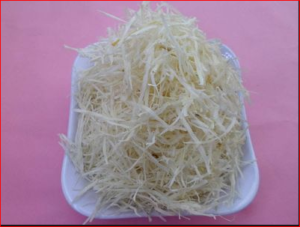Rhoddyken
Business Person : I Own A Boutique, I Also Write And Edit Articles.
Wants to meet Business Partners : All Kinds Of Business
Articles
178
Followers
21
profile/6781FB_IMG_1568668550374.jpg
Rhoddyken

Abacha (African Salad): Health Benefits, Side Effect, And Lot More
~4.6 mins read
Abacha is a native delicacy that originated from the Eastern part of Nigeria. It is popularly called African salad in English. This delicacy is nutritious and mostly enjoyed by the Igbos.
It is served in Igbo land during coronations, traditional marriage, festivals, etc.
It is also enjoyed as snacks by many.
To Abacha lovers, they enjoy the food so well that they feel anyone that has not tried it is missing a lot. The food is not cooked just like salad and it is 100% African made that’s why it is popularly called “African sGal
Most Africans tend to enjoy more of westernized food than African dishes made from the roots which have been proven to be more delicious and healthy.
Abacha is made using dried cassava which is cut into pieces.
Abacha (African Salad) Nutrition
Abacha contains some vital nutrients such as
Abacha contains nutrients that are equal to other ingredients used in cooking such as crayfish, egg, stockfish, and most times garden egg is added to it.
This meal contributes about 19 percent energy, 23 percent protein, 21 percent fiber, 51 percent iron, 30 percent phosphorus, 36 percent zinc, and many others.
For a healthy balanced diet, it is advisable to eat Abacha with other foods.
How To Make Abacha (African Salad)
There are many ways to make this salad whichever way you choose to prepare it, it will still come out delicious but the more the ingredients, the more nutritious it becomes.
It can be more or less depending on the quantity you want but for the cause of this study we are using the following recipe
How it is prepared
Boil the kpomo (add seasoning) then dice the kpomo into small pieces.
Soak your dry fish ( Shrimps), stockfish, Shrimps in hot water, or boil a bit to soften them cut the dry fish and stockfish into pieces and fry. Then set aside for later use
Soak the potash in water for some minutes to dissolve, then sieve out the liquid.
Rinse the ugba in warm water and cut it into pieces. Then set aside for later use.
Put the dry Abacha in bowl, pour hot water on it allow to soak for about 2 minutes. Then sieve out the liquid.
Slice one onion into rings and dice the other onion into a box shape
Now everything is set for preparation!
Step 1
Pour palm oil into a pot add the potash liquid and stir until it becomes yellowish and a thick paste.
Step 2
Add the pepper, sliced onion, grounded calabash nutmeg, crayfish, ogiri, seasoning cube. Stir thoroughly till everything blends together and well combined.
step3
Put the pot on the fire (low heat) add the Abacha and mix very well. Turn off the heat when Abacha is warmed up
Note: Do not overheat the Abacha or leave too long on the heat in order not to end up with Abacha portage
Step4
Add ukpaka, sliced garden egg, cooked dried/ stockfish, and kpomo. Mix everything thoroughly and lastly, add the sliced leaves.
Your Abacha/ African salad is ready. Garnish with the sliced onion ring and enjoy your meal.
Health Benefits of Abacha (African Salad)
Does African Salad Aid Weight Loss?
Although Abacha contains high fiber which makes you feel full after eating little, it also contains calories of about 380. Food that contains that much calories cannot aid weight loss therefore eat it with caution.
Is Abacha Good For Pregnant Women?
Abacha without potash is good and healthy for pregnant women. Potash is from limestone and it is capable of causing miscarriage during pregnancy. Therefore pregnant women that crave Abacha, should eat the one that is prepared without potash. In conclusion, Abacha made with potash is not good/healthy for pregnant women.
Caution/Side effect of Abacha
Those preparing the dish (African salad) should be cautious of general hygiene as the food can be contaminated during preparation due to unhygienic handling and this can lead to stomach upset, diarrhea, vomiting, etc.
Copied
Advertisement

Link socials
Matches
Loading...


